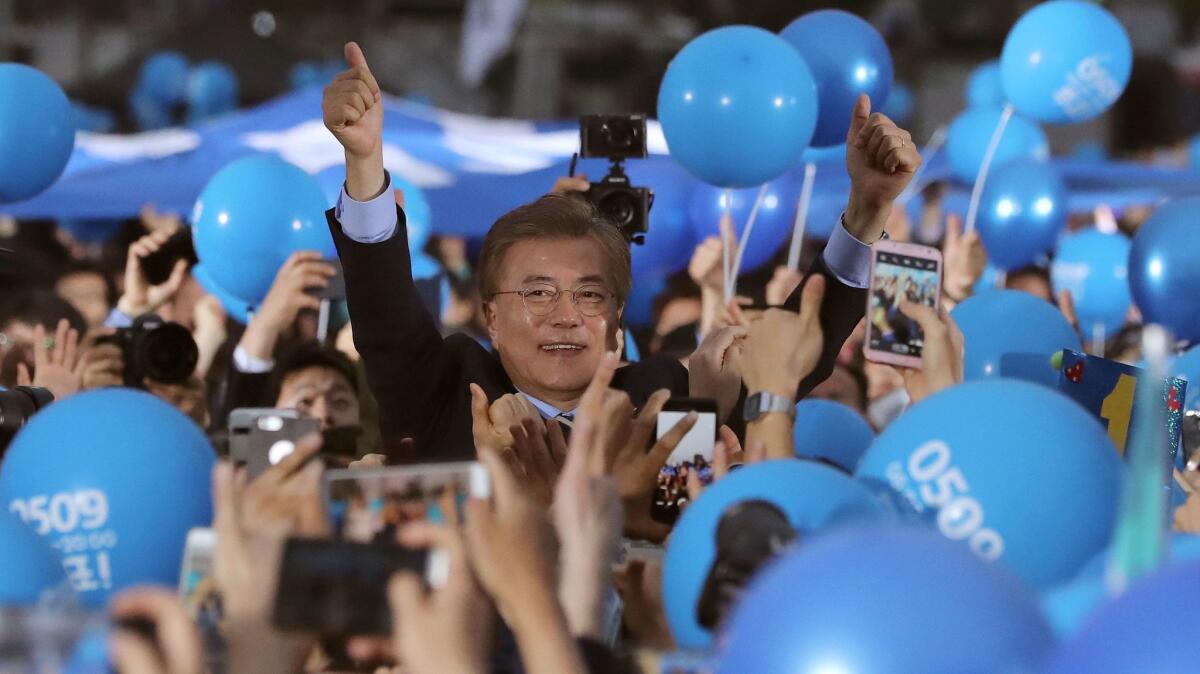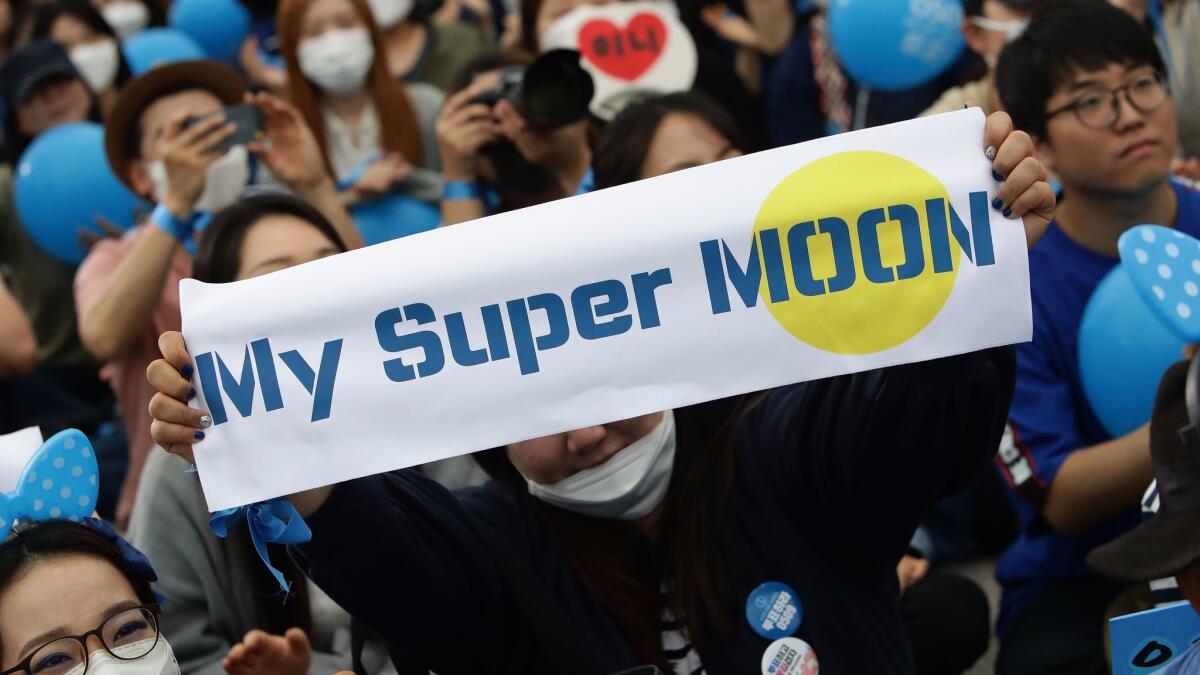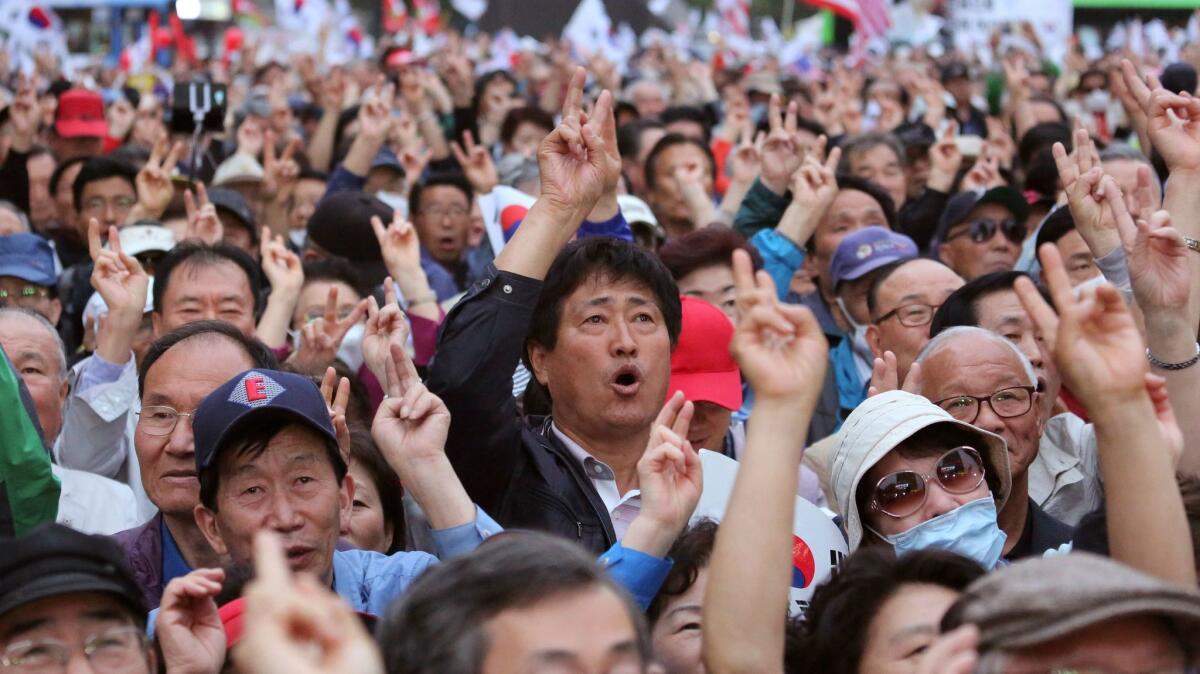South Korea’s presidential election could change its relationship with the United States. Here’s why

- Share via
Reporting from Seoul — South Korean voters will pick their next leader on Tuesday at a challenging moment in the nation’s democratic history, after months of political turmoil, mounting regional tension and uncertainty over new leadership in the United States.
The voters, according to the latest polls, appear poised to select a center-left candidate, Moon Jae-in, whose election would end nearly a decade of conservative party rule, signaling potential shifts in policy and tone on the nation’s relationship with the United States and its chief foe, North Korea.
About one in four voters have already cast presidential ballots in what promises to be a high-turnout and historic contest to replace Park Geun-hye, the impeached former president who remains jailed in a corruption case that forced her from office earlier this year.

Moon, the Democratic Party candidate, is a lawyer and former top presidential aide who narrowly lost a tight race against Park in 2012.
Other candidates have mounted respectable campaigns that likely will prevent anyone from reaching a majority. No runoff is required and the winner — despite most likely receiving only a plurality of the votes — will take over immediately.
The incoming leader inherits a hefty and difficult portfolio, including bubbling domestic concerns about economic opportunity and the familiar divides over national security. There’s also the long-standing but newly resonant public concern about collusion between the nation’s family-run conglomerates, known as chaebol, and government leaders.
The latter issue is a holdover from decades-old policies designed to jump-start the national economy — now Asia’s fourth largest, after China, Japan and India — after the devastation of the Korean War. Largely under Park’s father, the authoritarian President Park Chung-hee, South Korea’s government in the 1960s and ‘70s forged especially tight bonds with corporate titans.
That ultimately led to the ouster of Park Geun-hye on charges that she and a friend colluded with the de facto leader of Samsung, the most-powerful conglomerate here, in exchange for allegedly improper payments. The company has denied wrongdoing.
Park remains jailed on multiple corruption charges. Authorities say her longtime confidant, Choi Soon-sil, used her influence with the president to extort tens of millions of dollars from powerful companies.
The scandal sparked massive street rallies that ultimately prompted the National Assembly to impeach Park, but also sparked new questions about government ethics in modern South Korea.
It’s basically a free-for-all ... and a lot of that is because the Korean right just imploded under the weight of this scandal.
— Robert Kelly, an associate professor of international relations at Pusan National University
This election, perhaps given the massive media coverage and national protests demanding Park’s resignation, has prompted South Koreans to vote early — a relatively new phenomenon here. More than 11 million ballots were cast before election day, more than a quarter of the potential electorate.
Whoever replaces the disgraced former president won’t have an easy job, analysts say. The early turnout may show a strong national interest in the race, but the large field of ideologically mixed and relatively viable candidates could leave many voters disappointed by the outcome.
“There’s no question that there is an extremely high level of interest among voters regarding the outcome of the presidential election,” said Bong Young-shik, a research fellow with the Institute for North Korean Studies at Yonsei University in Seoul.
“The high rate of early voting indicates a high level of expectation, and the expectation is not monolithic or linear. Constituent demands for the next government are extremely diverse.”
Some voters are mindful of the stakes.
“I made a careful choice, knowing that I am voting for a representative who will be responsible for our nation over the next five years,” said Kim Jeong-sook, 50, who lives in Seoul.
She voted for Moon Jae-in, who has signaled a more conciliatory tone toward North Korea — and perhaps a more skeptical view of South Korea’s strongest ally, the United States, which has 28,000 troops stationed throughout the country.
Political labels here can be deceiving to Western observers, but liberals in recent administrations have sought a more conciliatory, diplomatic policy toward the North, which has increased its nuclear and missile provocations dramatically in recent years. Conservatives have generally been more aligned with the Bush and Obama administrations, which sought to confront the North with pressure in the form of sanctions, military readiness or covert action.
Moon, for example, has questioned the decision by the Park administration and American officials to install the defensive missile system known as THAAD, or Terminal High Altitude Area Defense.
It’s designed to protect parts of South Korea from the North’s advancing nuclear and missile capabilities, which have heightened tensions here recently, but it also prompted domestic protests and economic retaliation from China, which fears the system encroaches on its own national security interests.
“I hope the new president deals with North Korea peacefully,” Kim said.
More than a dozen candidates are competing, in an election clouded in uncertainty about President Trump’s commitment to South Korea as a trade and regional security partner, but a few stand out.
Moon’s top competitors are Ahn Cheol-soo, a software entrepreneur turned politician and leader of the centrist People’s Party; and Hong Joon-pyo of the Liberty Korea Party, a former governor who leads the remnants of Park’s once-formidable political wing, now known as Liberty Korea Party.

Also getting notice in the contest are Yoo Seung-min of the conservative Bareun Party, which split with Park’s supporters over the impeachment; and Sim Sang-jung, a National Assembly member representing the more left-leaning Justice Party.
“It’s basically a free-for-all,” said Robert Kelly, an associate professor of international relations at Pusan National University, of all the factions. “It really is just like the Wild West, and a lot of that is because the Korean right just imploded under the weight of this scandal.”
South Korea voters, like those in the United States, have often been confronted with more of a binary choice in presidential elections — often with candidates split by familiar generational themes about democracy, the economy and security.
Such a diverse field of presidential candidates presents a challenge to some voters, like Kim Sungyoon, 21, a student who lives in the Seoul suburbs.
He confronted hard choices.
Kim, for example, voted for Sim Sang-jung — the most liberal of the major candidates — despite a desire for a hard-nosed approach to North Korea, a policy perhaps more aligned with Hong or Yoo.
But, like some other young South Koreans, he was concerned about the nation’s economic opportunities. The nation is grappling with how to deal with high household debt, youth unemployment and income inequality.
Those worries carried more weight than security for Kim, a first-time voter.
“I am a college student who will have to work after graduation,” he said, raising concerns about notoriously long working hours here and a desire for more worker protections. “We are in a very unstable position.”
ALSO
North Korea detains another U.S. citizen amid rising tensions, state media reports
China signals new era as first homegrown jetliner takes off
You’ve got the munchies and you’re in North Korea. Don’t worry — we’re here to help
Stiles is a special correspondent.
More to Read
Sign up for Essential California
The most important California stories and recommendations in your inbox every morning.
You may occasionally receive promotional content from the Los Angeles Times.











